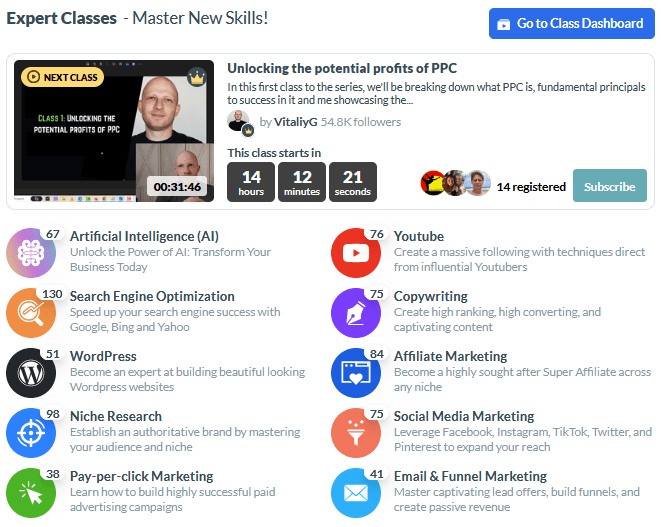
If you have been looking for a way to make money online, you have likely come across Wealthy Affiliate.
But if you are like me, you also want to do more research than just trusting the first review you find, and then you have likely heard some claim that Wealthy Affiliate is a pyramid scheme and an MLM company.
But after having worked online for many years now, I know that there are a lot of people with ulterior motives, and you need to get a balanced view and weigh the pros and cons of any opportunity before making your own decision.
This is what the article will help you with. I have been a member of Wealthy Affiliate for years, but I have also used and tested many other similar programs, and here I will share my experiences so you know exactly what to expect before deciding if this is for you or not.
Wealthy Affiliate Overview
I am not going to go into all the details about what the platform is and what it offers. You can read all about that in my full Wealthy Affiliate review here.
But in short, Wealthy Affiliate has built a name for itself as an online education platform. It's a platform where you can learn to build an online business from the ground up, with a heavy focus on affiliate marketing.
It is not about getting rich quickly through a recruiting frenzy; it's about learning to build a real business, focusing on any interest or passion you might have.
When you first join, the focus is on the resources you get access to, including community support, step-by-step guides, and practical tools for running an online business.
Sure, Wealthy Affiliate has its own affiliate program, which is one of the reasons some claim it is a pyramid scheme.
But before answering the one key question: Is Wealthy Affiliate a pyramid scheme, let's first go into what a pyramid scheme actually is.
The Realities of Pyramid Schemes Versus Wealthy Affiliate
It is critical to understand what a pyramid scheme is before claiming a company is one.
Pyramid schemes have a notorious reputation for promising high financial returns, primarily through recruiting new members without genuine products or services in the mix. It is usually an unsustainable business model, where the initial members benefit at the expense of those who join later. This model, at some point, crashes when there aren't enough new recruits to feed into the system, leading to the majority of participants losing out.

These schemes typically do not have much transparency. Instead, you're met with vague promises of sky-high returns in a suspiciously short time frame. Many countries have outlawed these types of schemes due to the financial damage they cause unsuspecting individuals.
Now, let's compare that with Wealthy Affiliate. The platform takes a very different stance.
Instead of a recruit-centric model, it's grounded in providing solid training, business tools, and resources for building an online business and learning to master affiliate marketing.
The endgame isn't about recruiting more and more members; it's about equipping each member with the ability to market effectively, create value, and, ultimately, establish a sustainable online business focusing on the passion or interest of your choice.
That's very different from the empty promises of quick riches through an ever-growing recruitment chain.
And I have gone through all the training at Wealthy Affiliate and are using the tools every day, so I know this is what they actually offer and not just what they say. In fact, I have managed to build a multiple 6-figure online business by following the training there without recruiting any new members.
But that does not mean it is a perfect platform, and I understand some of the criticism. So, let's dive deeper into why some claim it is a pyramid scheme or an MLM scheme.
Why some people say it is a pyramid scheme or MLM
If you have been searching for ways to make money online for a while, you have likely come across those who are quick to label every online business platform a scheme.
Let's face it: in an online environment where skepticism is necessary, Wealthy Affiliate has not escaped this scrutiny. Some individuals out there are vocal in their claims that Wealthy Affiliate is a pyramid scheme or a form of multilevel marketing (MLM).
The essence of their argument typically revolves around Wealthy Affiliate's affiliate program. They point to the Affiliate Bootcamp, which focuses on promoting Wealthy Affiliate itself. They argue that encouraging members to recruit others could be misconstrued as pyramid-like, especially in a saturated market that makes competition fierce.
Moreover, when new marketers struggle to choose a niche, they are sometimes guided towards promoting Wealthy Affiliate, which fuels the pyramid scheme narrative. Add to this the fact that Wealthy Affiliate offers higher commissions to Premium members, and critics are ready to call it ‘pay-to-play'.
It's important to clarify these points.
Critics often overlook that the Affiliate Bootcamp is just one part of the Wealthy Affiliate training; there's a multitude of courses aimed at broader affiliate marketing strategies for varied niches. And while the commission structure incentivizes premium membership, it crucially doesn't rely on multi-tiered recruitment, which is a foundation of pyramid schemes.

I'm not saying these concerns should be dismissed outright. It's important to have a critical eye on any platform. And I do agree that new members should maybe not even have the option to promote Wealthy Affiliate before they have seen some results using the platform – but that can be said about more or less any affiliate program.
However, putting Wealthy Affiliate under the microscope reveals that its model doesn't fit the traditional mold of a pyramid scheme or MLM.
Their approach is focused on promoting a product – in this case, the educational content – not recruiting for the sake of recruitment.
Many who have raised the pyramid scheme flag have often not completed the Wealthy Affiliate program or may have other motives, such as promoting competing programs. This can skew the narrative, presenting a picture tinted by personal gains rather than objectivity.
As mentioned earlier, I have been able to create a successful business using Wealthy Affiliate, and I did not start recommending it to others before I had already created a multiple 6-figure online income, so I know it works.
And there are numerous other success stories that aren't rooted in promoting Wealthy Affiliate alone but reflect the diverse applications of the skills learned through the platform.
But I understand why you are still skeptical. I was also very skeptical before joining. That is why I encourage anyone interested in joining Wealthy Affiliate to explore and evaluate the platform for themselves.
Because you can actually test some of the training and tools completely for free before deciding whether it is for you or not.
Concluding the Wealthy Affiliate Debate: Educational Resource or Scheme?
Wealthy Affiliate has been a point of contention for some time, with various voices online pitching in on its legitimacy. But let's strip away the noise and look at the facts.
Wealthy Affiliate's focus on practical education, tool provision, and member support underlines its genuine intent as a legitimate platform for learning affiliate marketing.
Now, some critics raise the Affiliate Bootcamp, niche selection process, and its commission structure as points of concern, suggesting a model similar to a pyramid scheme. However, a closer look reveals that the platform's affiliate program compensates for actual product promotion, not mere recruitment – a clear departure from pyramid tactics.
For anyone wary of scams, I recommend starting with the free Starter membership offered by Wealthy Affiliate. It's a chance to explore without financial commitment, reflecting the company's confidence in its value proposition. Committing to a niche that sparks your passion is key, and Wealthy Affiliate recommends you choose this for greater chances of success and to enjoy what you do.
Furthermore, understanding the distinctions between a pyramid scheme, MLM, and affiliate marketing is crucial. Wealthy Affiliate's business model, with its single-level referral program and absence of recruitment requirements, stands apart from the multi-level structures and emphasis on recruitment seen in pyramid schemes and many MLMs.
Ultimately, you're going to find Wealthy Affiliate is what you make of it. It presents itself as one of many tools in your arsenal for online business success, not as a get-rich-quick scheme.
In my opinion, that's where its true value lies – providing resources that empower you to build something meaningful on your terms.
If you want to know more about the platform and the training and tools it offers, or if you are interested in trying out the free membership for yourself, you can check out my full Wealthy Affiliate review here.
And if you have any questions or comments, I would love to hear from you in the comment section below.